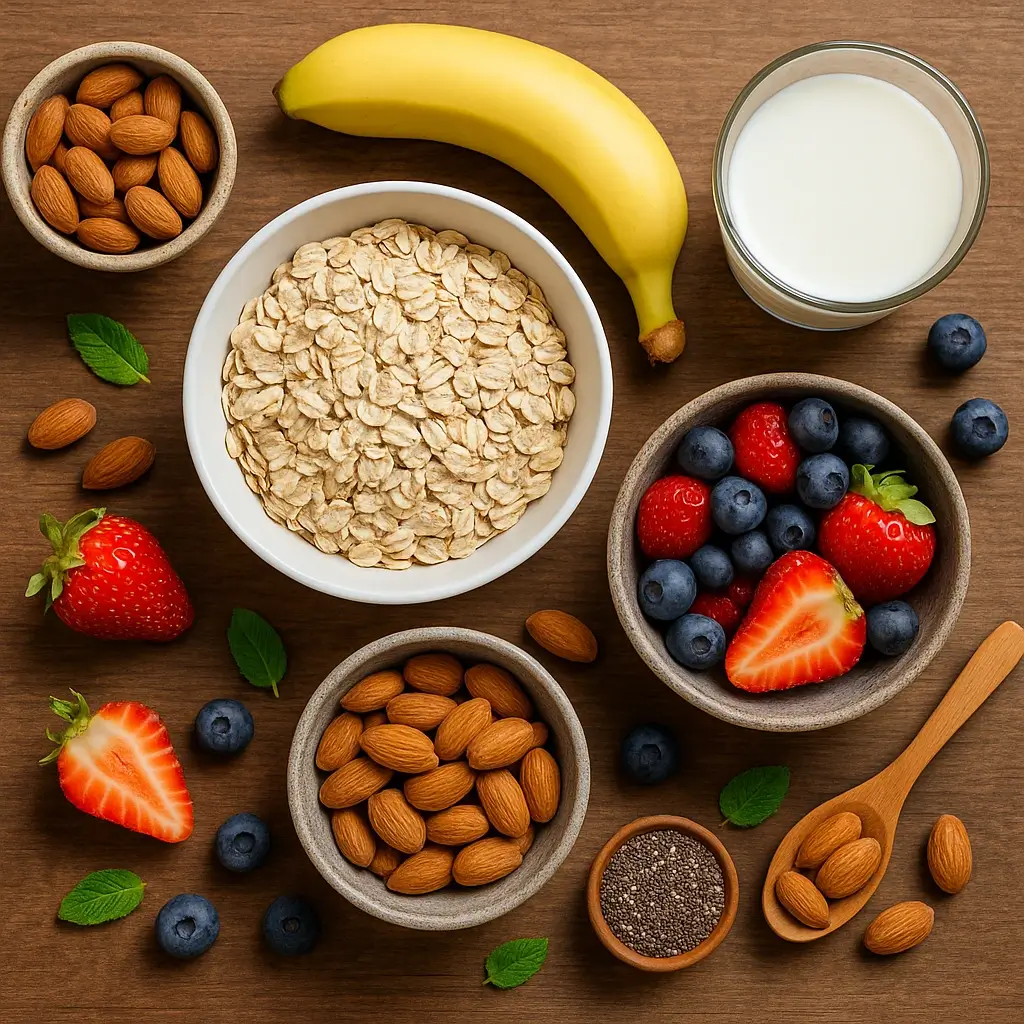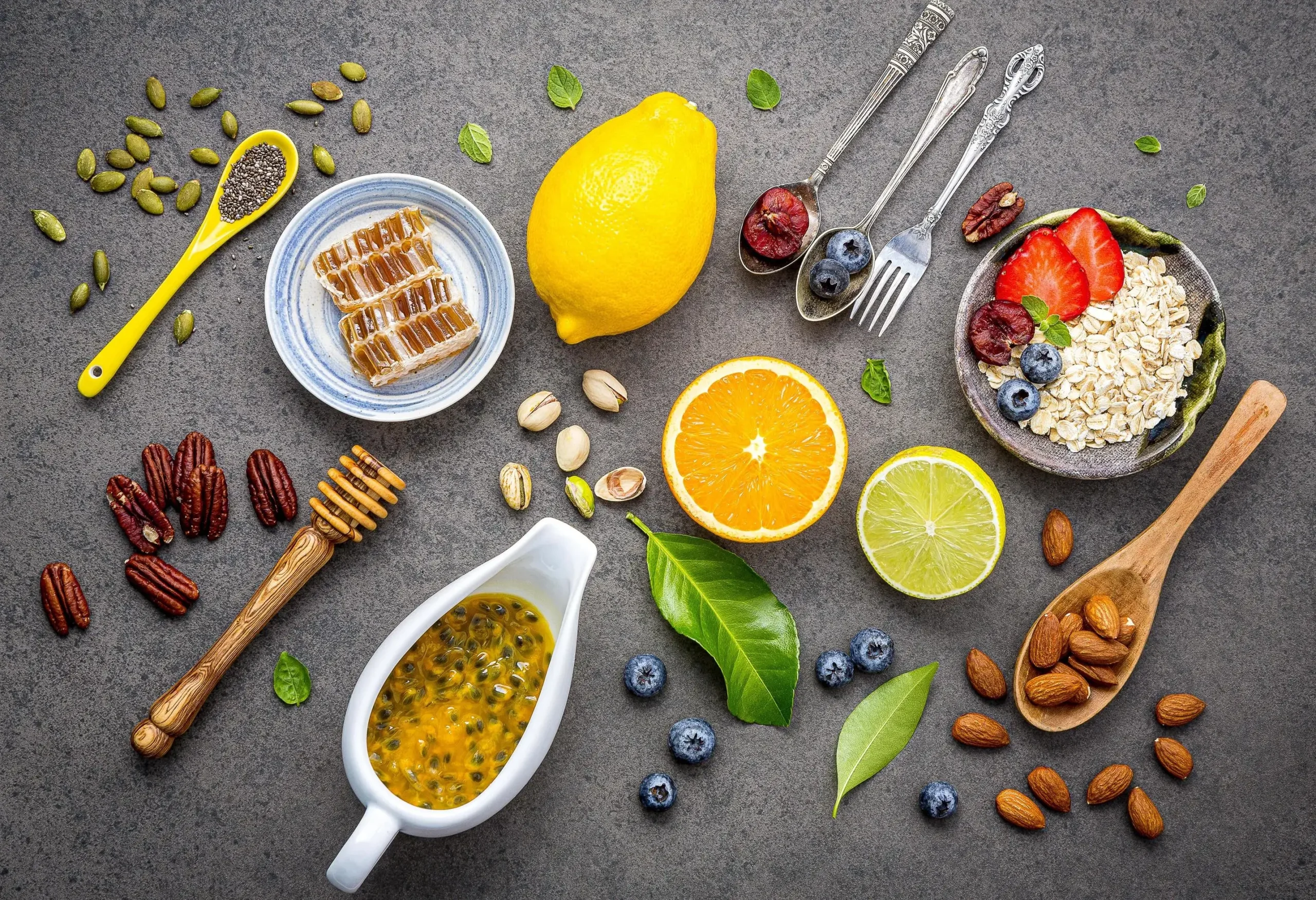Introduction
Choosing the right healthy foods for a balanced diet is one of the most impactful decisions for your long-term health. A nutrient-rich meal plan fuels your body, boosts immunity, and helps prevent chronic diseases.
In this guide, we’ll explore the best health foods, their benefits, and practical ways to incorporate them into your daily routine.
1. The Importance of Healthy Foods and Balanced Diet
Why It Matters
A well-balanced diet provides essential nutrients that support physical and mental health. Consuming whole, unprocessed foods can:
- Enhance energy levels
- Support heart health
- Improve digestion
- Strengthen immunity
- Promote mental clarity and focus
2. Top Healthy Foods for a Balanced Diet to Include in Your Meals

1. Leafy Greens: Essential Healthy Foods for Balanced Nutrition
Packed with vitamins A, C, and K, leafy greens such as spinach, kale, and arugula help support immune function and bone health.
2. Berries: Antioxidant-Rich Superfoods
Loaded with antioxidants, blueberries, strawberries, and raspberries help fight inflammation and support brain health.
3. Nuts and Seeds: Essential Healthy Fats and Fiber
Almonds, walnuts, chia seeds, and flaxseeds provide healthy fats, fiber, and protein, promoting heart and brain health.
4. Whole Grains: Sustained Energy and Digestive Health
Brown rice, quinoa, oats, and whole wheat are rich in fiber, aiding digestion and stabilizing blood sugar levels.
5. Fatty Fish: A Must-Have in a Balanced Diet
Salmon, mackerel, and sardines contain omega-3 fatty acids that support cardiovascular health and cognitive function.
6. Legumes: Affordable Plant-Based Nutrition
Lentils, chickpeas, and beans are excellent plant-based protein sources, rich in fiber and essential nutrients.
7. Fermented Foods for a Balanced Gut and Diet
Yogurt, kimchi, and sauerkraut provide probiotics that promote gut health and digestion.
8. Avocados: Healthy Fats for Heart and Brain Function
A great source of monounsaturated fats, avocados help support heart health and reduce inflammation.
9. Dark Chocolate: Antioxidant Treat in a Balanced Diet
Containing high levels of antioxidants, dark chocolate (at least 70% cocoa) helps lower blood pressure and improve mood.
10. Green Tea: Metabolism and Brain Support
A natural source of antioxidants and mild caffeine, green tea enhances metabolism and brain function.
3. Practical Tips to Add Healthy Foods to Your Balanced Diet
Simple Strategies
- Meal Prep: Plan and prepare meals in advance to maintain healthy eating habits.
- Smart Snacking: Swap processed snacks for nuts, yogurt, or fresh fruit.
- Balance Your Plate: Include a mix of protein, healthy fats, and fiber at every meal.
- Experiment with Recipes: Try new dishes incorporating different superfoods.
- Stay Hydrated: Drink plenty of water and herbal teas to support digestion and overall health.
4. Common Myths About Healthy Foods and Balanced Diets
1. Myth: Eating Healthy Is Expensive
Truth: Budget-friendly options like beans, lentils, and seasonal vegetables make nutritious eating affordable.
2. Myth: All Fats Are Bad
Truth: Healthy fats from nuts, avocados, and olive oil are essential for brain and heart health.
3. Myth: You Need a Strict Diet to Be Healthy
Truth: A well-rounded, flexible approach to healthy eating is more sustainable than extreme dieting.
Conclusion
Eating health foods doesn’t have to be complicated or restrictive. By making mindful choices and incorporating nutrient-rich foods into your meals, you can improve your well-being and enjoy a balanced, fulfilling lifestyle.
Which healthy food will you add to your next meal? Share your thoughts in the comments below!

